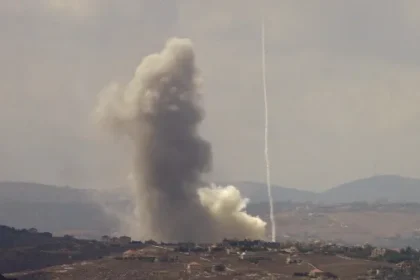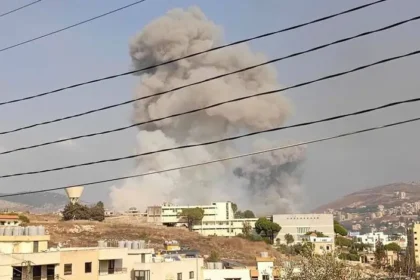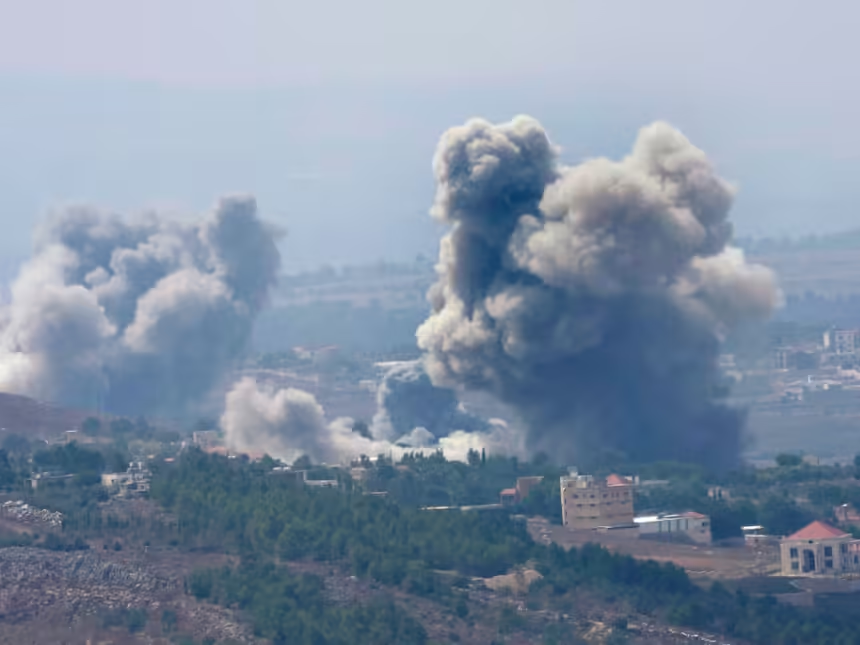In a major escalation of the conflict between Israel and Hezbollah, Israel airstrikes Hezbollah targeted more than 300 Hezbollah-linked sites across southern Lebanon and the Bekaa Valley on September 23, 2024, leading to at least 182 deaths and over 700 injuries. This marks one of the deadliest series of attacks in the ongoing conflict, as tensions between Israel and Hezbollah continue to rise.
Targeting Strongholds: Israel Airstrikes Hezbollah
According to Israeli military sources, the extensive airstrikes targeted Hezbollah’s weapons storage facilities, military positions, and logistical hubs. The airstrikes were part of Israel’s ongoing efforts to neutralize Hezbollah’s military capabilities and disrupt its operational command structure. These attacks focused on areas where Hezbollah has maintained a significant presence, especially in southern Lebanon, which has long served as a stronghold for the group.
The bombings hit 58 towns and villages, with many civilian homes caught in the crossfire. The Israeli Defense Forces (IDF) warned civilians in these areas to evacuate as the air campaign began. The Bekaa Valley, a strategic region where Hezbollah controls several key supply routes, was another focal point of the strikes. The IDF has described these operations as a defensive measure aimed at curtailing Hezbollah’s growing threat along Israel’s northern border.
The Chief of the General Staff approves strikes on Hezbollah targets in Lebanon from the IDF Headquarters Underground Operations Center. So far, more than 300 Hezbollah targets have been struck today. pic.twitter.com/hbNKWJ8QAs
— Israel Defense Forces (@IDF) September 23, 2024
182 Dead, Over 700 Injured: The Human Toll
As the dust settles, Lebanese authorities have reported that the airstrikes have left at least 182 people dead, with the majority of casualties being Hezbollah fighters, though a significant number of civilians were also killed. More than 700 people were injured in the attacks, many of them critically. Hospitals in southern Lebanon and Beirut have been overwhelmed with the influx of wounded, prompting emergency efforts by international humanitarian organizations to provide relief.
The Lebanese government has condemned the strikes, labeling them as acts of aggression and calling for international intervention to halt the violence. Lebanon’s Prime Minister has reached out to the United Nations and several world powers, urging them to pressure Israel to cease its military operations.
Hezbollah’s Retaliation: Rocket and Drone Attacks
In response to the Israeli airstrikes, Hezbollah launched a series of rocket and drone attacks aimed at military and civilian targets in northern Israel. The militant group reportedly fired 150 rockets within hours of the strikes, damaging properties and causing injuries. Israeli air defense systems intercepted many of these rockets, although several made it through, causing damage in northern Israeli towns. Hezbollah also launched armed drones, attempting to penetrate Israeli airspace, but most were shot down by the Israeli Air Force.
Hezbollah’s leader, Hassan Nasrallah, issued a statement after the retaliation, vowing further attacks if Israeli airstrikes continued. Nasrallah condemned Israel for what he called “indiscriminate bombing” of civilian areas in Lebanon, warning that Hezbollah’s response would escalate if necessary.

Wider Regional Implications: Escalating Toward a Broader Conflict
The conflict between Israel and Hezbollah is not happening in isolation. It comes at a time when Israel is engaged in a parallel conflict with Hamas in Gaza, adding complexity to the already tense regional dynamics. While the Israeli government has emphasized that its military actions are defensive in nature, aimed at protecting its citizens from Hezbollah’s rocket attacks, analysts are increasingly concerned that the situation could spiral into a wider regional conflict.
There are growing fears that Iran, a long-time supporter of Hezbollah, may become directly involved if the conflict continues to escalate. Iran has been a key backer of Hezbollah since its founding in the 1980s, providing financial support, weapons, and training. Given Iran’s vested interest in the outcome of this conflict, its involvement would likely exacerbate tensions across the Middle East.
Moreover, Syria—which has provided a crucial logistical base for Hezbollah—could also see its borders drawn into the conflict. Israeli airstrikes in Damascus and other parts of Syria have been reported in recent weeks, further complicating the geopolitical landscape.

International Response: Calls for Restraint
The international community has responded with growing concern. United Nations Secretary-General António Guterres has called for immediate de-escalation and a return to diplomatic discussions to prevent the conflict from expanding. The United States, while a strong supporter of Israel, has also urged both sides to exercise restraint, warning that a broader conflict could destabilize the entire region.
France and Russia have echoed similar sentiments, with both nations calling for urgent peace talks. Iran, on the other hand, condemned Israel’s actions and warned of dire consequences if further military actions were taken against Hezbollah or other Iranian-backed groups in the region.
The Situation on the Ground: A Humanitarian Crisis
Beyond the military implications, the airstrikes have resulted in a growing humanitarian crisis in southern Lebanon. Thousands of civilians have fled their homes, seeking refuge in Beirut or crossing into Syria. The destruction of infrastructure, including roads, bridges, and communication networks, has made it difficult for aid organizations to reach the affected areas. Several humanitarian groups have raised concerns about the lack of access to essential services like clean water, electricity, and medical supplies.
The International Red Cross and Médecins Sans Frontières are among the few organizations able to deliver aid, but they have stressed that the situation could worsen if the fighting continues. Many hospitals are running low on medical supplies, and the continuous airstrikes have made it difficult for humanitarian convoys to safely deliver relief.
BREAKING:
— sarah (@sahouraxo) September 23, 2024
Israel is carpet bombing civilian homes all across South Lebanon and the Bekaa Valley.
At least 58 towns and villages have been hit.
This is terrorism—plain and simple. pic.twitter.com/83IE1dFzBr
Conclusion: A Conflict with No Clear End in Sight
The recent Israeli airstrikes on Hezbollah-controlled areas in Lebanon have marked a dangerous escalation in a long-standing conflict that shows no signs of abating. With 182 dead and over 700 injured, the human toll continues to rise. As Hezbollah retaliates with rocket and drone attacks, and Israeli forces prepare for more strikes, the cycle of violence risks pulling the entire region into a broader conflict.
While the international community calls for restraint, it remains unclear whether diplomacy will be enough to prevent further bloodshed. As both sides dig in, the likelihood of a peaceful resolution seems increasingly remote, leaving the civilians of Lebanon and Israel caught in the crossfire.









